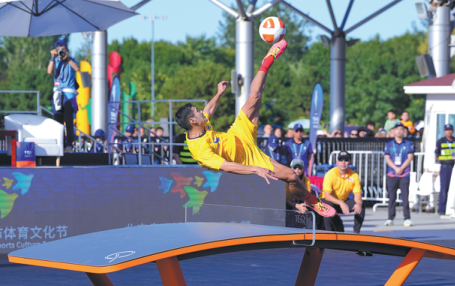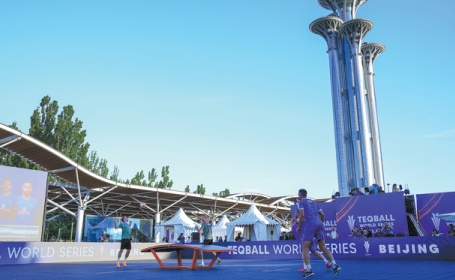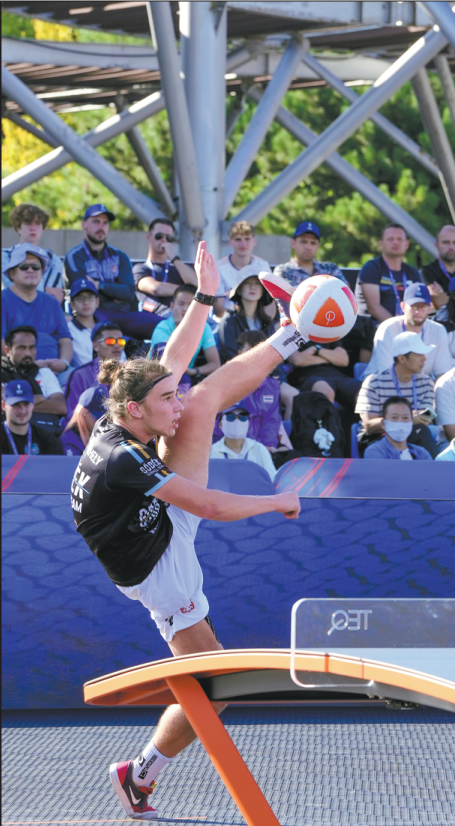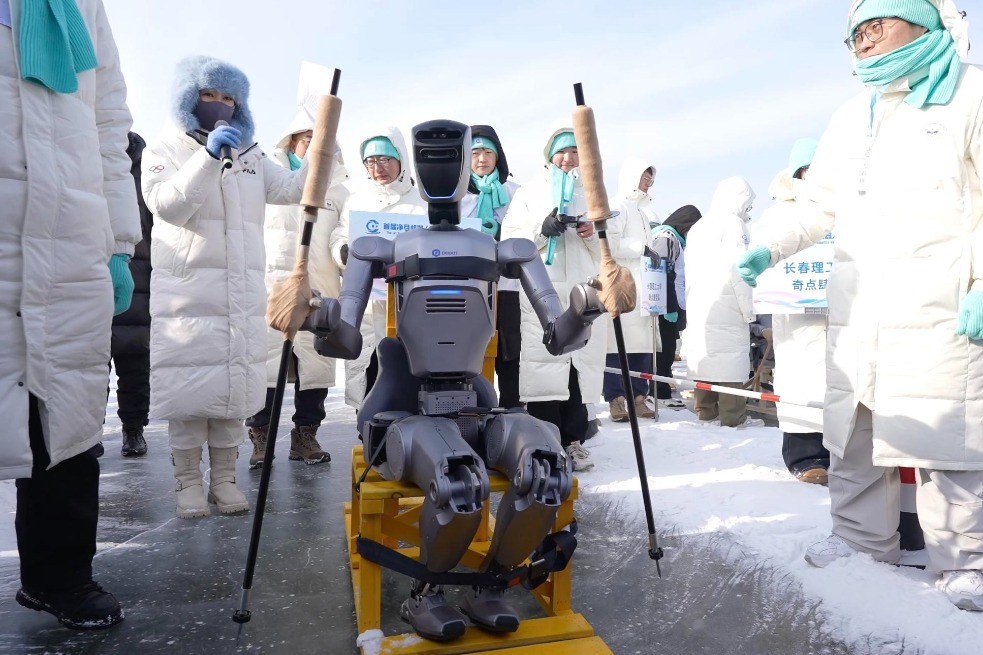GIVING THE GAME A LEG-UP
Beijing crowd gets its kicks, as teqball looks to tap Chinese market

Hungary's Krisztina Acs deftly sent the soccer ball soaring through the air toward her male teammate, Csaba Banyik, who, with lightning reflexes and a sudden burst of energy, raised his leg high above his shoulder to deliver a swift roundhouse kick.
Instead of firing the ball toward a goal, it spun over a clear plastic divider and onto the opposite side of an oddly curved ping-pong table.
This is mixed-doubles teqball — a Hungarian-born fusion of soccer and table tennis that has been around for more than a decade.
It's played on a curved tabletop that measures three meters in length, is 1.7 meters wide, 0.76 meters high, and is bisected by a rigid "net".
Typically, the game is contested in three-set matches, with doubles competitions being more popular than singles. Participants use a slightly underinflated ball and, similar to soccer, are allowed to strike it with any part of their body except their hands.
With its non-contact nature and gender-equitable competitions, it has been gaining popularity around the globe.
Currently, this soccer-based sport boasts over 5,000 athletes in more than 150 countries and regions, with over 2,000 clubs established worldwide.
On Sept 22, the Teqball World Series Beijing, which attracted more than 120 contestants from 16 countries, wrapped up in Beijing's Olympic Forest Park.
The event, co-hosted by the International Federation of Teqball (FITEQ), Beijing Olympic City Development Association (BODA), Beijing Sports Federation and the government of Chaoyang district, was the highest-paying stop in the history of the Teqball World Series, with a total prize purse of $60,000.
"Among the domestic events I've participated in, this competition featured the highest number of high-level foreign players," said Subiyinuer Abudureheman, a player from Urumqi, capital of China's Xinjiang Uygur autonomous region, who took part in the mixed doubles.
Salman Alibrahim from Kuwait expressed his admiration for the spacious outdoor competition venue.
"I love the vibes here. The weather is great, and there are many spectators," said the 25-year-old.
He transitioned from playing soccer to become a professional teqball player due to the limited popularity of the sport in Kuwait.
"Very few people in Kuwait play teqball. Many are unaware of this sport. I want to focus on promoting it among more people in my country," he added.
Apor Gyorgydeak, 24, the world No 1"teqer" from Romania, continued to demonstrate his dominance in the game by claiming the men's singles title.
"I'm happy that I managed to extend my undefeated streak, and my plan is to keep it up until the end of the year," he said.
Gyorgydeak enjoys the recognition brought by the emerging sport and the travel experiences of attending different international tournaments.
The Teqball World Championships, an annual competition organized by FITEQ, is currently the most important event for the world's teqball players.
Its inaugural edition took place in 2017 in Budapest, Hungary, where Adam Blazsovics, a local, became the first-ever teqball singles world champion.
The seasoned teqer also competed in Beijing. It's not his first time visiting China, as he participated in the Teqball Tour event held in Qingdao, Shandong province, in 2023 and the Xiamen Challenger Cup in Xiamen, Fujian province, in 2020.
Through the years, he notes, the pace of the matches at teqball events hosted in China has accelerated.
"Participants are becoming stronger, with more powerful smashes, and the organization of the game here is also improving," Blazsovics remarked.
Blazsovics, who studied to become a PE teacher at the University of Physical Education in Budapest, where he first tried playing teqball, shared his thoughts on the sport.
"I think it is a great opportunity for young people. Teqball is not a contact sport, so you don't have to worry about injuries caused by rough collisions.
"Perseverance is extremely important in this sport. In the beginning, you may often fail, but it is crucial not to give up," he said.
For Chinese teqer Cui Yazhen, teqball demands precise technical skills that require continuous practice. Now a PE teacher at Jimei University in Xiamen, she transitioned to teqball after retiring from professional soccer due to injuries.
"Teqball places high demands on players' flexibility and coordination, with relatively lower requirements for speed and endurance.
"It means that I can continue participating in this soccer-based sport, post-injury," Cui explained.
BODA has been actively promoting the emerging sport in China. On Sept 20, it partnered with FITEQ, Capital University of Physical Education and Sports, and the Beijing Teqball Association to establish the International Teqball Research Center, aiming to improve, develop and promote the sport.
According to Gao Yunchao, deputy director of BODA, Beijing now has nearly 40 teqball promotion bases, with almost 30,000 participants engaging in teqball activities throughout the year.
"The development of teqball in China is crucial, as it will impact the growth of the sport not just in Asia, but globally," said Gabor Borsanyi, president of FITEQ and one of the creators of the hybrid sport.
"FITEQ's goal is to make teqball an Olympic sport, and I believe that the development of teqball in China will accelerate the realization of this objective."




Today's Top News
- PBOC cuts rates on targeted monetary tools
- Legal tools essential for AI regulation
- China calls for dialogue on Iran situation
- Denmark rebuts Trump's Greenland security claims
- China, Canada vow to enhance bilateral ties
- Xi's speech at Central Urban Work Conference to be published






























